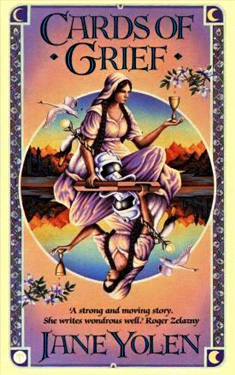Jane Yolen
Completed 1/22/2022, Reviewed 1/22/2022
4 stars
This book is the first of two Mythopoeic Award winners by Yolen. I read the second, Briar Rose, just over two years before this one and really liked it, despite its disturbing setting. I also really liked this one. It’s sort of a science fantasy, mixing the two genres. Yolen does it superbly, creating a narrative of a planet of people who grieve being studied and interfered with by Earthlings. The prose is lovely and the culture that Yolen creates is amazing. She wrote this story when she herself was grieving after the loss of her father who had lived with her and her family at the end of his life. This book won the 1985 Mythopoeic Award.
On a distant planet is a sole small continent inhabited by the survivors of a global flood. Their culture is based on the grief from this tragedy. It is said that when they stop grieving, the world will end. The story begins with the Queen telling an Earth anthropologist the story of the finding of Linni, aka the Grey Wanderer. She is a child prodigy in writing grief poetry. She becomes the Queen’s Master Griever. The book shifts between transcripts, so the story continues via an interview with the succeeding King. He tells the story from his perspective (I won’t go into all the shifting perspectives). Then the Earthlings visit the planet and the anthropologist commits the grievous act of interfering culturally with native peoples. But it takes the successive interviews to fully extract what really happened.
The form of the book takes some getting used to. As the Queen and the King only tell truth, even if it is only their truth, the narrators are unreliable. Even Aaron the anthropologist has blurred memories of the incident because of his being drugged. It is a tale of lies and betrayals. It bounces back and forth between these narrators as well as the transcripts from Aaron’s court-martial hearing.
The world-building is pretty phenomenal. A world of grieving as a lifestyle is quite inventive. It has a ritualized euthanasia. Sex is constant as males are only fertile for five years, particularly for the queens who try to bear daughters anyway they can in this matrilineal government. There’s no real concept of father as a result.
The characters are pretty well developed with the demure and profound Linni being the main character. She only narrates one small portion of the story at the very beginning. We really learn of her through the other narrators. Aaron is also interesting as the young and naïve anthropologist. He maintains his innocence of the charge of cultural interference and only learns the truth of what happened at the end of the book. I felt a lot of empathy for both these characters. The Queen and King are both very conniving and it is hard to like them. They are fleshed out pretty well too. They are not simply the bad guys in this story, but have much more depth than you’d expect.
I give this book four stars out of five. It’s pretty great story telling, reminiscent of the different perspectives of the same tale as Kurosawa’s film “Rashomon”. I was surprised by the book considering this is a Mythopoeic winner though it leans a little more heavily on the science fiction side. However, this whole culture based on grief is really amazing with its history and rituals. Yet the book isn’t really depressing. I guess I viewed it anthropologically, as a matter of fact rather than emotionally or morally. But it can be cathartic as even I reflected on the experiences of grief in my own life.

No comments:
Post a Comment